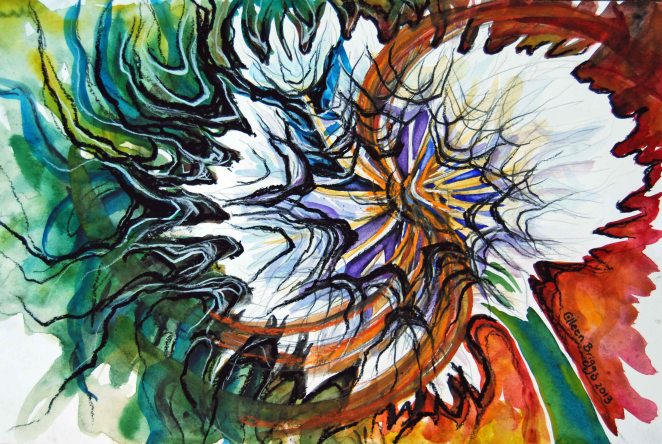
Growing Strong and Free; 2013; 12 x 18″; mixed media: pencil, lithograph crayon, charcoal, watercolor, pastel.
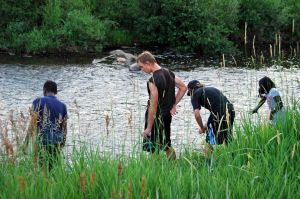 We explore a silky summer evening, airbrushed with cool mountain air and golden sinking light. Newly arrived in Steamboat Springs, we wander west. The river is gift enough, flowing like laughter between us. One of those rare series of moments when you feel so alive, so present to where you are, so thankful to love the people you are with. Our four kids skip rocks and play “Pooh Sticks” on a weathered wood bridge. Then we stumble on a gate hidden in a crook of the path. “Yampa Valley Botanic Park,” a humble sign declares. On the other side, brilliant colors beckon from deepening shadows. One of us lifts the latch and the gate creaks open. Just like that, we freely step into an elaborate secret garden. Paths laced with thriving green and flower bursts lure us deeper, all the more enchanting for being so unexpected.
We explore a silky summer evening, airbrushed with cool mountain air and golden sinking light. Newly arrived in Steamboat Springs, we wander west. The river is gift enough, flowing like laughter between us. One of those rare series of moments when you feel so alive, so present to where you are, so thankful to love the people you are with. Our four kids skip rocks and play “Pooh Sticks” on a weathered wood bridge. Then we stumble on a gate hidden in a crook of the path. “Yampa Valley Botanic Park,” a humble sign declares. On the other side, brilliant colors beckon from deepening shadows. One of us lifts the latch and the gate creaks open. Just like that, we freely step into an elaborate secret garden. Paths laced with thriving green and flower bursts lure us deeper, all the more enchanting for being so unexpected.
I remember stumbling upon another secret garden, concealed in the mountain reaches of Vietnam – its light emanating from an altogether “other” source, its vibrant colors shimmering in an altogether different realm:
To travel there, my identity as a Westerner is carefully concealed by a sun hat and rectangular fabric mouth covering hooked over my ears with elastic, commonly used by Vietnamese to screen pollution. When the car rolls to a stop, high on a rocky road, we hustle, heads down, through the door of a home. The people inside motion for us to remove our disguises, and we smile in relief and greeting.
Through our guide, Thanh, we meet the couple who own the home, a man identified as an “evangelist” and his wife. I can’t take my eyes off them. The man is like a mirror reflecting some distant radiance. His glowing, graceful wife settles on a hammock at the back of the room, cradling a young child. Their brilliance, like a late-day wash of sun, dances over a garden of children whispering, wiggling, and giggling on a woven floor mat.
The couple leads a church of about 200 people, a US-based humanitarian aid organization’s hands and feet to sponsor an educational scholarship group of thirty impoverished students and a social worker. The group started with fifteen Christian families and fifteen families of other beliefs. The “pod” we are visiting is one of three in Vietnam serving a total of ninety children.
Just two weeks before our visit, government officials made the rounds of all the families with students in this group. They ordered the parents to withdraw from the program, threatening to confiscate houses or jobs and deny any government aid, such as support in the event of natural disasters. If parents continue in the scholarship program, officials threatened, their children will not be allowed to attend secondary school. The Christians remain resolute and fearless, trusting in God as their ultimate authority. But four of the non-Christian families, immigrants from the North where government oppression is even more severe, withdrew.
We learn that despite multiple offers from outside non-profit organizations to build additional schools in the area, the government adamantly refuses. Children in grades 1-5 attend a school in the village, but those in grades 6-9 walk 14 km round-trip. Students in grades 10-12 re-locate to a boarding school 30 km away where they are not allowed to attend church and have no money to visit their families. The government sponsors an educational loan program, but not for Christians.
Why is the government so afraid of education for these people? The reasons are complex. As recently as five years ago, this particular tribal group peacefully requested the return of their land which was confiscated after the Vietnam War. This area was once a separate country, and the government fears that they will attempt to secede from Vietnam. Army and police officers quickly and violently squelched demonstrations. Keeping the people deliberately uneducated is a blatant strategy to keep them oppressed. Christians, in particular, are viewed as a threat. They are not afraid of the government and they refuse to subscribe to the unified ideology of Communism. Additionally, many tribal Christians sided with the Americans in the Vietnam War and represent a long-held defiance of the government.
After interviewing some of the students, we ask more questions about the evangelist and the church. When Thanh translates that the evangelist is on the government “Black List,” the man laughs with a razor sharp glint in his eyes of unshakeable confidence, unbending will, and untarnished worship. Again and again, he recalls, government officials admonished him to stop inciting the people to praise God. I see it in my mind’s eye: he bows his head in respect as they berate him, unflinching, trying to hide that blinding smile. Then he watches the receding dust of their vehicles, turns on his heel, and steps back into the church to lead his people. Like the early church in Acts, they cry out to God, not for protection from their oppressors, but for increased boldness.
In Vietnam, churches are openly persecuted until they reach a critical mass of about one hundred. They can then submit an application for “recognition” by the government, a status through which they are supposed to experience religious freedom. Many never receive recognition, even after growing to more than three hundred members. In some parts of Vietnam, even “recognition” guarantees little religious freedom. This particular church reached the capacity to qualify for recognition, but has been denied in retaliation for the evangelist’s defiance through the years.
When the body of believers began construction on a church building next to his house, government officials demanded that they stop. Church members called on a major leader of the denomination, well-known by the government and protected by multiple connections with outsiders. He drove up the winding mountain road and stood resolutely in the middle of the construction.
“Kill me,” he told the officials, “but they are going to build this church.”
The leaders grumbled amongst themselves and finally said, “Fine, we’ll just return when it is complete and tear it down.”
When they came back, the believers gathered; and the officials withdrew again.
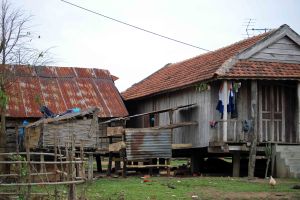 We don our disguises and walk to the nearby home of one of the Christian students. In a style common to the area, a weathered wood structure is raised on short stilts for ventilation. The nine-year-old girl’s father abandoned the family, and her mother labors in nearby fields to provide subsistence. We duck into the interior, all its meager contents visible in one room: a kitchen area with open cooking arrangement on the floor, shelves with food staples, a sack stuffed with clothing hanging from a roof beam, and a wooden bed draped in mosquito netting with a woven mat in place of a mattress. As we are leaving, the girl’s mother hurries towards us, a baby on her hip and a basket of farming utensils strapped to her back. With that same unearthly smile of the luminous evangelist, she thanks us profusely for making it possible for her daughter to attend school.
We don our disguises and walk to the nearby home of one of the Christian students. In a style common to the area, a weathered wood structure is raised on short stilts for ventilation. The nine-year-old girl’s father abandoned the family, and her mother labors in nearby fields to provide subsistence. We duck into the interior, all its meager contents visible in one room: a kitchen area with open cooking arrangement on the floor, shelves with food staples, a sack stuffed with clothing hanging from a roof beam, and a wooden bed draped in mosquito netting with a woven mat in place of a mattress. As we are leaving, the girl’s mother hurries towards us, a baby on her hip and a basket of farming utensils strapped to her back. With that same unearthly smile of the luminous evangelist, she thanks us profusely for making it possible for her daughter to attend school.
Before we leave the village, we pause in the sacred space of the church sanctuary, flush with serenity. Our new friends tell us the story of a nearby church that was ransacked and destroyed in 2010. A spokes-person from the largest government-recognized denomination in Vietnam, the Evangelical Church of Vietnam (South) said, “There was no reason for this – it is religious persecution, pure and simple, incited and allowed by local government officials.” (June 2010, Compass Direct News.)
A reverent breeze wafts through open windows and doors, bearing the pungent fragrance of bare red-brown soil prepped for planting. Misty mountains and fertile sugarcane fields sprawl beyond intricate metal-scrolled window frames. Zeal and joy reach for the open sky, here in this most unlikely place.
We bow our heads in prayer. When it is my turn, I offer my small, seemingly insignificant gift in a place already pulsing with the very Presence of God – I simply ask for more of what they already so bountifully possess. I have no doubt that God is standing in our very midst. I know, because I see His radiance reflected on the evangelist’s face.
Thanh puts it this way, “Every day, we pray for our people and the authorities, too. They do not know what they do. They need the Light. We always choose the solution ‘conquer them with love’.”
This clandestine garden in Vietnam looms large in my memory – all the more mysterious and wondrous for its hiddenness, its unexpectedness. I feel incredibly privileged to have stumbled upon it; its gate suddenly appearing in the crook of my life-path. The surreptitious flowers of Steamboat emblazon my heart with gratitude. The secret garden in Vietnam took root in my soul. I slip back through the gate in my mind, and I am intoxicated with the heady scent of courage, growing strong and free.
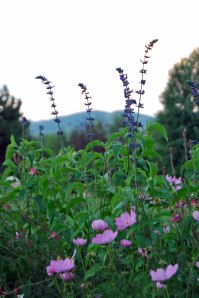
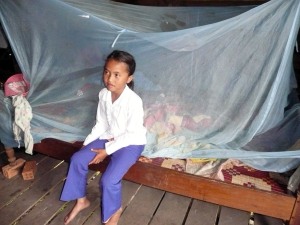
Reading your blog today took me back. I felt the same emotions, tears welled up again. It’s good to remember. Thank you for sharing this powerful story again.
Lorie
LikeLike
I am so glad to have shared the experience with you! Thank you Lorie.
LikeLike
Great Read! Congrats on getting pressed!
LikeLike
Thank you midwesternplants, I am so honored and encouraged! Thanks for reading!
LikeLike
Heart warming story!
LikeLike
Hi Yummyfoodmadeeasy, Thanks so much for visiting my blog and for the encouraging comment. I feel so lucky to have experienced this place in Vietnam, and it’s a joy to share with others. Colleen
LikeLike
Absolutely beautiful thanks for taking the time to write this!
LikeLike
Thank you for reading!
LikeLike
Reblogged this on Kmareka.com and commented:
Wow, this is fascinating…
LikeLike
Thank you! it’s an honor to be re-blogged!
LikeLike
Reblogged this on caringheartfamilylifecare's Blog and commented:
STORIES FROM VIETNAM. Everyone of us has a secret garden that changed our lives
LikeLike
Thank you for the honor of being re-blogged!
LikeLike
You are welcome my dear
LikeLike
Thank you Colleen, this garden is secret and makes you remember all details. I think I can understand all words you mean but it is very good story.
T.
LikeLike
It is a privilege to know you and I thank God that He allowed our paths to cross. Praying for you!
LikeLike
Beautifully Written! 🙂
LikeLike
Thank you for reading Random Ramblings!
LikeLike
I miss this beautiful country I once called home. I have a love/hate relationship with this country. I love the culture, the food, the music, the arts, and the people; hate the corruption, the government, the bribery, and the politics.
LikeLike
I can only imagine the stories you have to tell. I am thankful I caught a glimpse of the beauty of this country, though my heart aches for the hardship and suffering of many.
LikeLike
Moving and beautifully written. Thank you. Alienora
LikeLike
Thank you for sharing the journey with me Alienora!
LikeLike
amazing story
LikeLike
Thank you!
LikeLike
Reblogged this on Sweet sharing.
LikeLike
Thank you for the honor of being re-blogged. I enjoyed perusing your blog just now.
LikeLike
Privilege was all mine . Sharing & getting inspired is the purpose of my blog. I enjoyed reading your post. Lets get inspired by each other 🙂
LikeLike
Reblogged this on MUSE-AHOLIC.
LikeLike
Thanks for this glimpse into the light and the dark side of Vietnam. They are a courageous group, your heroes in this story. Blessings to you in your work and to them for carrying the light.
LikeLike
I love your phrase “to them for carrying the light.” That’s exactly it – I was so privileged to see the way they carry the light. Thank you for reading and for your encouragement!
LikeLike
Lovely, just lovely. I have children (and a grandchild) moving to Vietnam soon. This encouraged me.
LikeLike
There is much to love in this beautiful country. Thank you for reading and taking the time to send encouragement to me!
LikeLike
Thank you for sharing such a lovely time in your life. I could sense that which I believe you wanted us to feel and was blessed for sure. I chose to share it on FB. Vietnam has always been on my heart, as a baby boomer, I had friends that were marred by its devastating war. What a blessing that so many are choosing to support them and their children, which could very well be some of ours.
Big Hugs, and blessings, Marsha
LikeLike
THank you for the encouragement Marsha! Thank you for even sharing it with your facebook friends. It was amazing to visit in-person places where many battles took place and even a beach where Vietnamese fled on boats after Saigon fell. I felt much closer to my family members and friends who were engaged in the Vietnam war after seeing where they spent those terrible years, and I hope that my stories can bring healing for them, too.
LikeLike
Reblogged this on red rabbit skills services | skills development consultancy.
LikeLike
Reblogged thanks for sharing your story 🙂
LikeLike
THank you so much for spreading this story!
LikeLike
My pleasure! 🙂
LikeLike